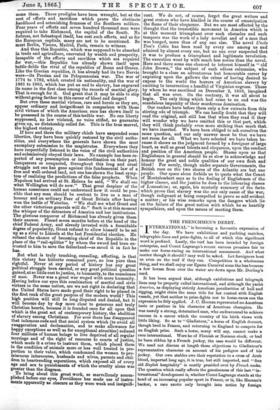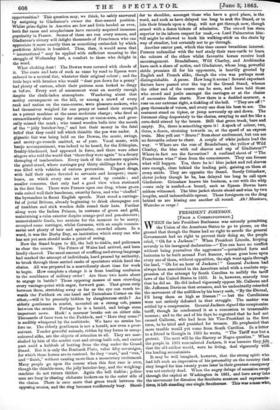THE FRENCHMEN'S DERBY.
" INTERNATIONAL " is becoming a favourite expression of _IL the day. We have exhibitions and yachting matches, telegraphic lines and prize-fights, to all of which this significant word is prefixed. Lastly, the turf has been invaded by foreign enterprise, and Count Lagrange's recent success promises fair to make our horse-racing an international amusement. And what matter though it should? may well be asked. Let foreigners beat us even on the turf if they can. Competition is a wholesome thing, and we shall enjoy our Epsom Carnival none the less because a few horses from over the water are down upon Mr. Dorling's card.
It has been argued that, although exhibitions and telegraph lines may be properly called international, and although the yacht America, as displaying strictly American peculiarities of hull and rigging, might claim the same title for her contest with English vessels, yet that neither to prize-fights nor to horse-races can the expression be fitly applied. J. C. Heenan represented no American taste or pastime in his character of American champion. He was merely a strong, determined man, who endeavoured to achieve success in a career which the country of his birth views with little liking. So as to " Gladiateur," a horse of English descent, though bred in France, and returning to England to compete for an English prize. Such a horse, many will say, cannot make a race international. Were he of Flemish or Norman stock, or had he been ridden by a French jockey, the case would be different. We need not discuss at length these objections to Gladiateur's representative character on account of his pedigree and of his jockey. Our own stables owe their reputation to a cross of Arab blood, imported long ago, it is true, but still imported, and "fine old English hospitality" is mostly presided over by French cooks. The question which really affects the genuineness of this last "in- ternational" development is, whether Count Lagrange stands at the head of an increasing popular sport in France, or is, like Heenan's backer, a rare exotic only brought into notice by foreign
opportunities? This question may, we think, be safely answered by assigning to Gladiateur's owner the first-named position. Whilst prize-fights in America are few and little heeded as ever, both flat races and steeplechases have recently acquired immense popularity in France. Scores of them are run every season, and Gladiateur's victory will delight thousands of Frenchmen who can appreciate it more exactly than as something outlandish by which perfidious Albion is humbled. Thus, then, it would seem that " international " may be applied with sufficient meaning to the struggle of Wednesday last, a comfort to those who delight in the word.
What choking dust ! The Downs were covered with clouds of it. The coats and hats of such as came by road to Epsom were reduced to a neutral tint, whatever their original colour ; and the little boys with brushes who would "dust you down for a penny" had plenty of custom, albeit their patrons soon looked as dingy as before. Every sort of amusement went on merrily enough despite the chalk-laden atmosphere. Wandering about that motley encampment on the hill, or among a crowd of every rank and nation on the race-course, were pleasure-seekers, who had themselves weighed for one penny or tested their strength on a patent machine at the same moderate charge; who fired at extraordinarily short range for oranges or cocoa-nuts, and gene- rally missed the mark ; who tossed wooden balls into the mouth of the " jolly butcher-boy," and lost their money in the fatal belief that they could tell which thimble the pea was under. A gigantic fair was being held on the Downs, the music, swings, and merry-go-rounds omitted, as of yore. Vocal music, with banjo accompaniment, was indeed to be heard, for the Ethiopian, freshly-blackened, had appeared in force, and there were other singers who told the world that' "there they were again" to a dreary thumping of tambourines. Every inch of the enclosure opposite the grand stand, where carriages pay thirty shillings for a place, was filled with vehicles of various pretension. Elegant drags, with half their space devoted to servants and hampers ; omni- buses, on which every one- sat or stood up outside ; and smaller concerns, that only had a good view when stationed in the first line. There were Parsees upon one drag, whose green veils suited well their handsome, swarthy faces, and who "chaffed" the bystanders in fluent English speech. Next stood a carriage- ful of jovial Britons, already beginning to drink champagne out of tumblers and stick wooden dolls round their hats. Further along were the Indian Princes, in costume of green and gold, maintaining a calm exterior despite orange-peel and pea-shooters ; unmistakeable Gauls, too anxious for the moment to be merry, occupied some carriages, whilst Germans, with an ample commis- sariat and plenty of hair and spectacles, crowded others. In a word, it was the Derby Day, an institution which every one who has not yet seen should make a point of seeing.
Now the Stand began to fill, the bell to tinkle, and policemen to clear the course. The Prince of Wales had arrived, and been loudly cheered. The usual amount of scuffling and strong language had marked the attempt of individuals; hard pressed by authority, to break through those serried ranks of spectators which lined the chains. All was prepared in a marvellously short time for work to begin. How complete a change it is from bustling confusion to the semblance of military order ! Are those two hosts about to engage in battle? Those opposing masses- of men crowding every vantage-point with eager, forward gaze. That green strip between them, stretching away as far as the eye' can, reach to- wards the Paddock on one hand and Tottenham Corner on the other,—will it be presently hidden by slaughterous strife ? Au elderly gentleman in scarlet, mounted on a strong cob, passes between the armies. Perhaps he is a herald, and brings some important news. Hark ! a murmur breaks out on either side. Thousands of faces turn to the Paddock, and " Here they come'!" is audibly whispered by the multitude. We have no armies be- fore us. The elderly gentleman is-not a herald, nor even a pour- advent. Yonder graceful animals, ridden by tiny forms in many- coloured silks, are the objects of attention to all. They are mar- shalled by him of the scarlet coat and strong-built cob, and canter past amid a hubbub of betting from the ring under the Grand Stand. But it is only the Bentinck Plate, value fifty sovereigns, for which these horses are to contend. So they "start," and "run," and "finish," without causing more than a momentary excitement. Many people go upon the course when this first race is over, though the thimble-man, the jolly butcher-boy, and the weighing- machine do not 'return thither. Again the bell tinkles ; police- men are busy in-chasing obdurate lookers-on to the outer side- of the chains. There is once more that green track between the opposing armies, and the ring becomes vociferously busy. Shoup
der to shoulder, amongst those who have a good place, is the word, and such as have delayed too long to seek the Stand, or to Join their friends upon a drag, will not get through now, though armed with a dozen tickets of admission. The crowd has risen superior to its inborn respect for rank,—a Lord Palmerston him- self might be allowed to hook his walking-stick on the chain by way of steadier, but certainly not to go through.
Another canter past, which this time causes breathless interest. Persons unfamiliar with the turf study their race-cards to learn the colours of the riders' whilst favourite horses receive loud encouragement. Breadalbane, Wild Charley, and Archimedes have each a share of notice, and Gladiateur, whose long, powerful stride promises ill for his opponents, is heartily greeted by English and French alike, though the viva was perhaps most distinguishable. A pause. How long it seems ! Several expectant flutters have passed over the top of the Grand- Stand, whence the other end of the course can be seen, and have told those who crowd and jostle amongst the carriages or at the chains of successive false starts. Now there is a decided murmur, a roar on our extreme right, a tinkling of the bell. " They are off ! " gasp thousands of voices, and every one does his beat to see. The rearmost stand on tiptoe, or jump nervously up and down. The foremost cling desperately to the chains, swaying to and fro like a corn-field stirred by the breeze. Still that green track, bare and empty. No, there is something upon- it ! A speck of colour, two, three, a dozen, straining towards us, at the speed of an express train. Men yell out " Bravo !" from sheer excitement, but can see no favourite colour to cheer. A couple of white' jackets lead the way. " Where are the rose of Breadalbane, the yellOw of Wild Charley, the blue with red sleeves and cap of Gladiateur?" Where in fact are the favourites? A confused shout of "The Frenchman wins!" rises from the connoisseurs. They can foresee what will happen. Yes, there he is! blue jacket and red sleeves sure enough,. close behind the leading. pair, gaining. on, them at every stride. They are opposite the Stand. Surely Grimshavr, clever jockey though he be, has delayed too long to call upon Gladiateur. Grimshaw knows his business, a cut with the whip —one only is needed—a. bound, such as Epsom Downs have seldom witnessed. The blue jacket shoots ahead, and wins by two lengths, amid indescribable uproar. Those foreigners- on the drag behind us are kissing one another all round. Ah ! Messieurs, Waterloo se venge































 Previous page
Previous page